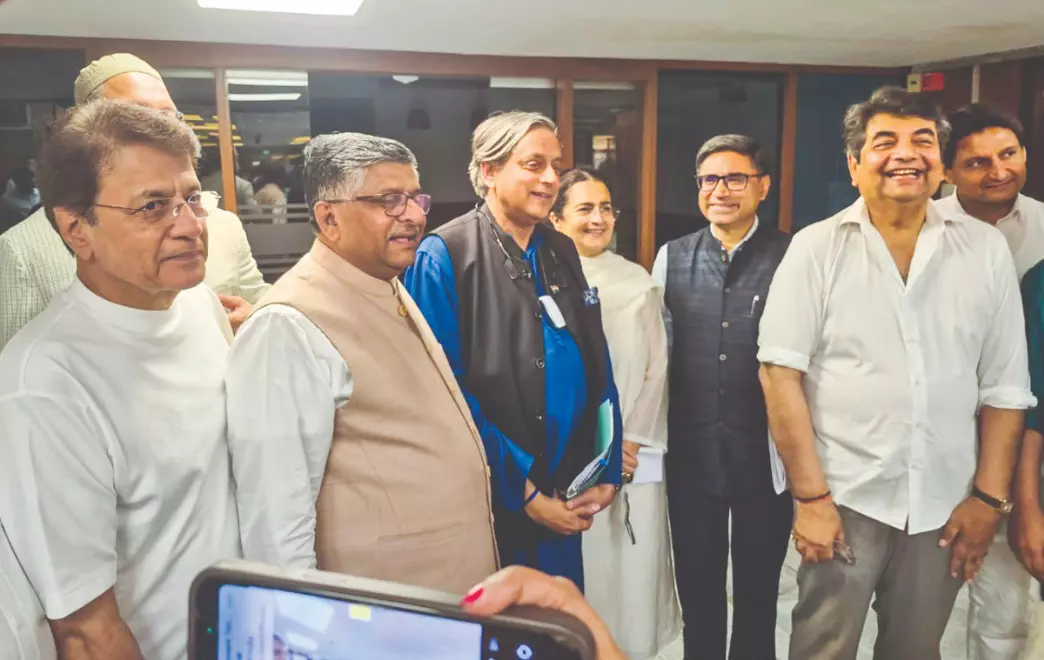‘No nuclear signalling from Pak’: Misri to Parliamentary panel

New Delhi: Foreign Secretary Vikram Misri informed members of the Parliamentary Standing Committee on External Affairs on Monday that the recent conflict between India and Pakistan remained within conventional limits, and there was no indication of nuclear signalling from Islamabad, according to sources present at the closed-door session.
Addressing questions raised by opposition lawmakers, Misri reiterated the government’s position that the decision to end cross-border military operations was reached bilaterally. This response came amid queries over former US President Donald Trump’s public claims that his administration played a key role in de-escalating tensions between the two countries.
One member of the committee, which is chaired by Congress MP Shashi Tharoor, reportedly asked why the Indian government had not issued a more pointed rebuttal of Trump’s remarks. Misri, in response, reportedly said with a touch of humour that Trump had not sought his permission before making such claims.
“India and Pakistan arrived at the decision to cease military actions following a conversation between the Directors General of Military Operations (DGMOs),” Misri told the committee, sources said. He underlined that the ceasefire was mutually agreed upon at Pakistan’s request.
During the three-hour meeting, which saw participation from 24 members—described by Tharoor as a record turnout—the Foreign Secretary also faced questions about Pakistan’s alleged use of Chinese military platforms, the stance of countries like Turkiye and Azerbaijan, and Islamabad’s recent success in securing an International Monetary Fund (IMF) loan.
Responding to concerns about Pakistan’s weapons systems, Misri said the origin of the platforms used was immaterial. “What matters is that India struck their air bases effectively,” he said, according to one member present.
On the IMF loan issue, Misri acknowledged that India had opposed the move. “Different countries are governed by their own strategic and economic interests,” he was quoted as saying.
Regarding the increasingly adversarial posture taken by Turkiye, Misri noted that the country had historically not aligned with India on major geopolitical matters. “Given their consistent attitude, I do not foresee a turnaround in relations, especially concerning Pakistan,” he said.
A section of the meeting also focused on the Pahalgam terror attack and broader concerns regarding cross-border terrorism. The Foreign Ministry, in its presentation, stated that in the past year alone, India faced at least 24 terror attacks linked to groups operating out of Pakistan, resulting in the deaths of 24 security personnel and 30 civilians.
The ministry’s presentation outlined that these terrorists were often equipped with advanced military hardware. “These included military-grade arms, secure communications devices, steel-coated bullets, and assistance via drones and coordinated ceasefire violations,” the ministry briefed.
Members also addressed recent online attacks targeting Misri and his family following the announcement of the ceasefire. According to Tharoor, the committee stood united in support of Misri’s work and expressed solidarity with him against such online abuse. While members proposed a formal resolution, Misri reportedly requested the committee to refrain from passing one.
The discussion also included a brief exchange on the public statements made by External Affairs Minister S Jaishankar regarding Operation Sindoor. Responding to opposition concerns over reported remarks suggesting advance notice to Pakistan, Misri said such interpretations were inaccurate. He clarified that contact at the DGMO level was made only after India had carried out its strikes on May 7.
Lawmakers from across party lines attended the meeting, including Abhishek Banerjee (TMC), Rajeev Shukla and Deepender Hooda (Congress), Asaduddin Owaisi (AIMIM), and Aparajita Sarangi and Arun Govil (BJP). The agenda focused on recent foreign policy developments between India and Pakistan following heightened military engagement and the retaliatory Operation Sindoor.
India and Pakistan formally agreed to halt military operations on May 10.



